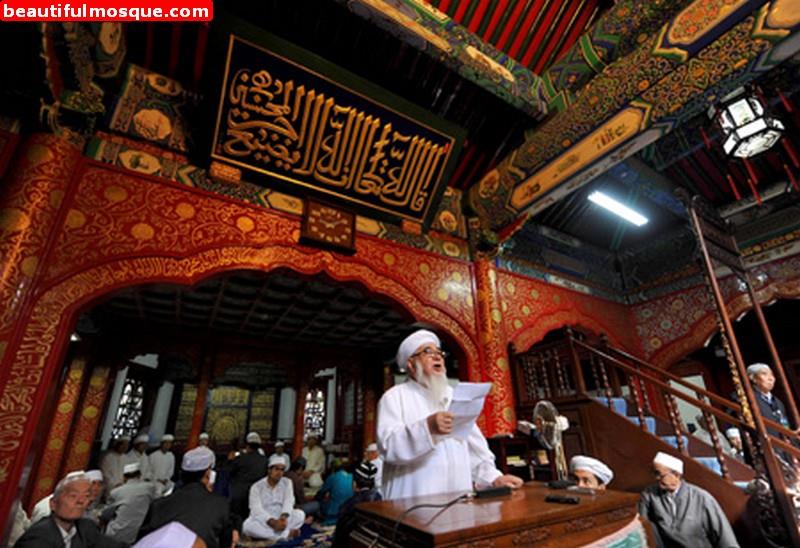www.aljazeerah.info
Opinion Editorials, April 2018
Archives
Mission & Name
Conflict Terminology
Editorials
Gaza Holocaust
Gulf War
Isdood
Islam
News
News Photos
Opinion Editorials
US Foreign Policy (Dr. El-Najjar's Articles)
www.aljazeerah.info
China Pledges to Protect Freedom of Religion Amid Reports of Religious Repression By Abdus Sattar Ghazali Al-Jazeerah, CCUN, April 6, 2018 |
 |
 |
|
| https://www.beautifulmosque.com/Hui-Mosque-in-Ningxia-China |
China pledged to continue to respect and protect its citizens' freedom of religious belief in a white paper published Tuesday (April 3, 2018).
As a socialist country under the leadership of the Communist Party of China (CPC), China adopts policies on freedom of religious belief based on national and religious conditions to protect citizens' right to freedom of religious belief, build active and healthy religious relationships, and maintain religious and social harmony, said the white paper published by the State Council Information Office, titled "China's Policies and Practices on Protecting Freedom of Religious Belief."
Protecting freedom of religious belief, properly handling religious relations and adapting them to the times, and curbing religious extremism are common tasks facing all countries around the world, said the white paper.
China will uphold the principle that religions in China must be Chinese in orientation and provide active guidance to religions so that they can adapt themselves to the socialist society, it said.
The major religions practiced in China, which are Buddhism, Taoism, Islam, Catholicism and Protestantism, have a total of nearly 200 million believers and more than 380,000 clerical personnel, according to Xinhua news agency.
The Chinese government supports all religions in upholding the principle of independence and self-management, according to the document.
The religious activities of foreigners in China are protected in accordance with the law, the white paper said.
Foreigners may attend religious activities at temples, mosques, churches, and other sites for religious activities, but shall conduct religious activities in line with law, it stressed.
Religious extremism and violent terrorist activities are dealt with in accordance with the law, the document noted. China opposes all extremism that seeks to instigate hatred, incite discrimination and advocate violence by distorting religious doctrines or through other means, it said.
"China takes measures against the propagation and spread of religious extremism, and at the same time, carefully avoids linking violent terrorism and religious extremism with any particular ethnic group or religion," the white paper said.
There are about 5,500 religious groups in China, including seven national organizations, and about 144,000 places of worship registered for religious activities in China, including 33,500 Buddhist temples of different schools, 9,000 Taoist temples, 35,000 Islamic mosques, 6,000 Catholic churches and places of assembly spread across 98 dioceses, and 60,000 Protestant churches and places of assembly, according to the white paper.
About 20,000 prominent religious figures are serving as deputies and members at all levels of people's congresses and committees of the Chinese People's Political Consultative Conference, according to the document.
Council on Foreign Relations Report
The Chinese Communist Party (CCP) is officially atheist, but it has grown more tolerant of religious activity over the past forty years following extensive efforts to eradicate religion under Mao Zedong, according to the Council on Foreign Relations (CFR).
Amid China’s economic boom and rapid modernization, experts point to the emergence of a spiritual vacuum as a trigger for the growing number of religious believers, particularly adherents of Christianity and traditional Chinese religious groups, the CFR reported on March 15, 2018, and added: “While China’s constitution allows religious belief, adherents across all religious organizations, from state-sanctioned to underground and banned groups, face intensifying persecution and repression.”
Article 36 of the Chinese constitution says that citizens “enjoy freedom of religious belief.” It bans discrimination based on religion and it forbids state organs, public organizations, or individuals from compelling citizens to believe in—or not believe in—any particular faith. The State Council, the government’s administrative authority, passed new regulations on religious affairs, which took effect in February 2018, to allow state-registered religious organizations to possess property, publish literature, train and approve clergy, and collect donations. Yet alongside these rights come heightened government controls. The revised rules include restrictions on religious schooling and the times and locations of religious celebrations, as well as monitoring of online religious activity and reporting donations that exceed 100,000 yuan (around $15,900).
The FCR quoted Human Rights Watch’s China director, Sophie Richardson, as saying that while religious belief in China is protected by the constitution, the measures “do not guarantee the right to practice or worship.” Religious practices are limited to “normal religious activities,” though “normal” is left undefined and can be broadly interpreted. The state recognizes five religions—Buddhism, Catholicism, Daoism, Islam, and Protestantism. The practice of any other faith is formally prohibited, although often tolerated, especially in the case of traditional Chinese beliefs. Religious organizations must register with one of five state-sanctioned patriotic religious associations, which are supervised by the State Administration for Religious Affairs (SARA).
The government’s tally of registered religious believers is around one hundred million (less than 10 percent of the population), according to several sources including the United Nations Human Rights Council’s 2013 Universal Periodic Review. Yet some independent reports suggest the number of religious adherents in China is far larger and is steadily increasing. The research and advocacy group Freedom House estimates there are more than 350 million religious believers in China, primarily made up of Chinese Buddhists, followed by Protestants, Muslims, Falun Gong practitioners, Catholics, and Tibetan Buddhists. Many believers do not follow organized religion and are said to practice traditional folk religion. These practitioners, along with members of underground house churches and banned religious groups, account for many of the country’s unregistered believers. One of the higher estimates comes from the U.S. State Department’s 2016 International Religious Freedom Report, which says there are about 650 million Chinese religious believers.
Abdus Sattar Ghazali is the Chief Editor of the Journal of America .
http://www.journalofamerica.net/April-2018/ChinaReligion/chinareligion.html
***
Share the link of this article with your facebook friends
|
|
|
|
||
|
||||||


